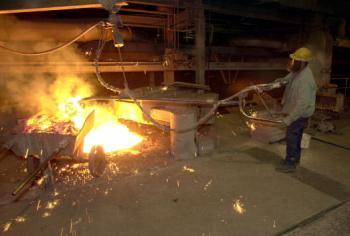After years of striving to be the world’s leading financial hub the contest between Britain and America has produced broken banks and explosive debt.
By the 1980s the bankers’ regime had displaced the productive industrialists in manufacturing to become the policy makers in both countries.
Instead of making things necessary for everyday use the emergence of merchant banks ushered in a culture of making money through speculation in various forms of stock market ventures and real estate deals.
As multinationals, the banks demanded and won deregulation of the financial systems in the advanced nations which would lead to their collapse.
The bankers were providing finance to a clutch of stock brokers, lawyers, hedge funds and corporate raiders to target perfectly sound business enterprises for asset stripping and hostile takeovers without the making of a single nail.
Since the financial meltdown became apparent in 2008, leaving Europe, Britain and the US struggling to manage massive public debt and deficits, the merchant bankers have been looking elsewhere for their pickings in fees.
In recent months scores of bankers and other financiers have been arriving in Australia and saying “Australia the place to be” and “$68 billion in fees here”:
*JP Morgan bank announced that 100 analysts would join more than 900 existing staff in Sydney, Melbourne and Wellington.
*UBS Swiss merchant bank will boost its Asia-Pacific workforce by 10 per cent.
*Australia’s $1.2 trillion superannuation funds are a magnet for international property fund managers looking to sign up an initial $1 billion from the super funds for speculation in real estate and real estate debt in distressed offshore markets.
Out of the blue we learn that six of China’s large banks led by Industrial and Commercial Bank have set up shop in Australia.
Such a level of economic penetration of our nation by the totalitarian communist regime warrants a full explanation from our authorities.
A reference point for this is outlined in ‘China’s cheque book threatens our economic sovereignty’ (The Epoch Times October 8, 2009).
During 30 years of financial deregulation the merchant banks began to create and sell financial instruments called collateralised debt obligations (CDOs) bearing higher than normal rates of interest. The CDOs sprang from house mortgages offered to people in the United States who had no jobs and no income.
The marketers of the CDOs were Lehman Brothers, Merrill Lynch, Goldman Sachs, UBS, Credit Suisse and some smaller Wall Street banks in the US and through their hundreds of subsidiaries worldwide.
The buyers of these toxic CDOs were superannuation funds, mutual funds, insurance companies, foreign banks, governments, foreign central banks and corporations. These bodies have worthless CDOs sitting in their books.
Local councils in Australia are suing for $700 million, among the many enterprises to issue class actions for recovery of investments made after false or misleading credit ratings were posted for toxic CDOs.
Right now US prosecutors are investigating giant Morgan Stanley for allegedly misleading investors about mortgage derivative deals the bank helped design and bet against.
“Much of the financial industry is a racket and change is vital,” writes Paul Krugman, a leading economics commentator in The New York Times, “The US Securities and Exchange Commission is charging that Goldman Sachs created and marketed securities that were bound to fail so that an important client could make money off that failure. I would call that looting.”
The business editor of the Herald Sun, Terry McCrann writes: “But the fact remains that investment banking is not just a disgrace. Much worse, it has become a parasite on the economy and the broader society.
“The financial services industry should become again a servant of the economy and the society – not a self-perpetuating, plundering end in its own right.”
Money making has its place, but what about the Australian nation, its productive industry and its people.
Where’s the money for our manufacturers to make the fridges, washers, computers, televisions, trains, furniture, tools cars, clothes and all the things we need to stop the flood of foreign imports and thus reverse the runaway foreign debt nearing $700 billion?
The four big banks hold government licences to issue credit, but the banks’ money is being directed for profit making into home mortgages, some businesses and plenty of speculation such as CDOs.
But nation building is beckoning the Federal Government to step in and fill the credit gap itself by opening a bond market and establishing a development bank as it has done successfully in the past.
Six leading economists plus former ANZ Banking chief, Will Bailey, have been calling for such a bank.
The bank represents the missing link when Superannuation Minister, Chris Bowen, pointed to Australia’s $1.2 trillion superannuation funds to ensure they are used for the maximum advantage of the Australian economy.
There is no safer place to deposit the super funds than in a Federal Government bank offering a long bond rate of around 6 per cent interest, without losing money to fund managers and others for fees, commissions and charges. It certainly beats speculation in shares and property.
While there is a place for a financial services sector subject to proper Government regulation still to come, to see Australia as a financial hub like the United States and Britain, no thanks!
Frank Lee is a former editor of The Clerk, national journal of the Federated Clerks Union of Australia
By the 1980s the bankers’ regime had displaced the productive industrialists in manufacturing to become the policy makers in both countries.
Instead of making things necessary for everyday use the emergence of merchant banks ushered in a culture of making money through speculation in various forms of stock market ventures and real estate deals.
As multinationals, the banks demanded and won deregulation of the financial systems in the advanced nations which would lead to their collapse.
The bankers were providing finance to a clutch of stock brokers, lawyers, hedge funds and corporate raiders to target perfectly sound business enterprises for asset stripping and hostile takeovers without the making of a single nail.
Since the financial meltdown became apparent in 2008, leaving Europe, Britain and the US struggling to manage massive public debt and deficits, the merchant bankers have been looking elsewhere for their pickings in fees.
In recent months scores of bankers and other financiers have been arriving in Australia and saying “Australia the place to be” and “$68 billion in fees here”:
*JP Morgan bank announced that 100 analysts would join more than 900 existing staff in Sydney, Melbourne and Wellington.
*UBS Swiss merchant bank will boost its Asia-Pacific workforce by 10 per cent.
*Australia’s $1.2 trillion superannuation funds are a magnet for international property fund managers looking to sign up an initial $1 billion from the super funds for speculation in real estate and real estate debt in distressed offshore markets.
Out of the blue we learn that six of China’s large banks led by Industrial and Commercial Bank have set up shop in Australia.
Such a level of economic penetration of our nation by the totalitarian communist regime warrants a full explanation from our authorities.
A reference point for this is outlined in ‘China’s cheque book threatens our economic sovereignty’ (The Epoch Times October 8, 2009).
During 30 years of financial deregulation the merchant banks began to create and sell financial instruments called collateralised debt obligations (CDOs) bearing higher than normal rates of interest. The CDOs sprang from house mortgages offered to people in the United States who had no jobs and no income.
The marketers of the CDOs were Lehman Brothers, Merrill Lynch, Goldman Sachs, UBS, Credit Suisse and some smaller Wall Street banks in the US and through their hundreds of subsidiaries worldwide.
The buyers of these toxic CDOs were superannuation funds, mutual funds, insurance companies, foreign banks, governments, foreign central banks and corporations. These bodies have worthless CDOs sitting in their books.
Local councils in Australia are suing for $700 million, among the many enterprises to issue class actions for recovery of investments made after false or misleading credit ratings were posted for toxic CDOs.
Right now US prosecutors are investigating giant Morgan Stanley for allegedly misleading investors about mortgage derivative deals the bank helped design and bet against.
“Much of the financial industry is a racket and change is vital,” writes Paul Krugman, a leading economics commentator in The New York Times, “The US Securities and Exchange Commission is charging that Goldman Sachs created and marketed securities that were bound to fail so that an important client could make money off that failure. I would call that looting.”
The business editor of the Herald Sun, Terry McCrann writes: “But the fact remains that investment banking is not just a disgrace. Much worse, it has become a parasite on the economy and the broader society.
“The financial services industry should become again a servant of the economy and the society – not a self-perpetuating, plundering end in its own right.”
Money making has its place, but what about the Australian nation, its productive industry and its people.
Where’s the money for our manufacturers to make the fridges, washers, computers, televisions, trains, furniture, tools cars, clothes and all the things we need to stop the flood of foreign imports and thus reverse the runaway foreign debt nearing $700 billion?
The four big banks hold government licences to issue credit, but the banks’ money is being directed for profit making into home mortgages, some businesses and plenty of speculation such as CDOs.
But nation building is beckoning the Federal Government to step in and fill the credit gap itself by opening a bond market and establishing a development bank as it has done successfully in the past.
Six leading economists plus former ANZ Banking chief, Will Bailey, have been calling for such a bank.
The bank represents the missing link when Superannuation Minister, Chris Bowen, pointed to Australia’s $1.2 trillion superannuation funds to ensure they are used for the maximum advantage of the Australian economy.
There is no safer place to deposit the super funds than in a Federal Government bank offering a long bond rate of around 6 per cent interest, without losing money to fund managers and others for fees, commissions and charges. It certainly beats speculation in shares and property.
While there is a place for a financial services sector subject to proper Government regulation still to come, to see Australia as a financial hub like the United States and Britain, no thanks!
Frank Lee is a former editor of The Clerk, national journal of the Federated Clerks Union of Australia




